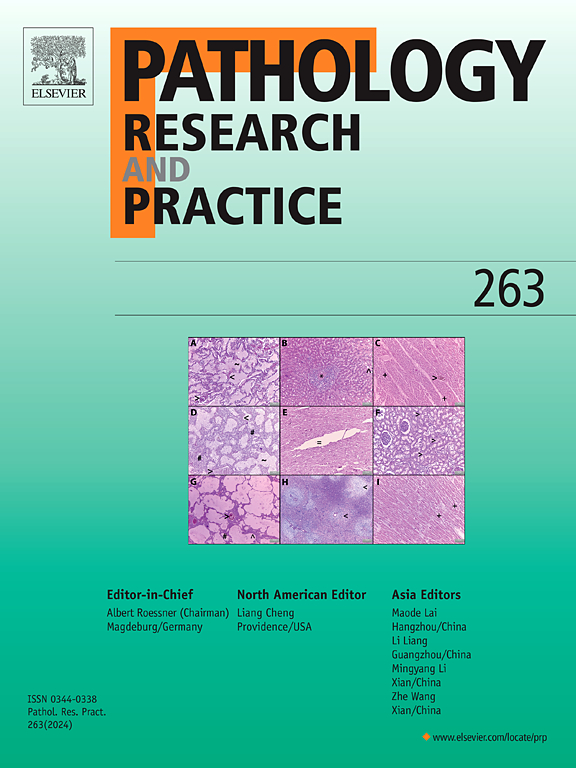C4d immunostaining facilitates differentiation of pemphigoid nodularis from prurigo nodularis
IF 2.9
4区 医学
Q2 PATHOLOGY
引用次数: 0
Abstract
Pemphigoid nodularis and prurigo nodularis have similar clinicopathological features and are difficult to distinguish. Enzyme-linked immunosorbent assays (ELISA) and direct/indirect immunofluorescence can support the diagnosis of pemphigoid nodularis, but sometimes show contradictory results or are unavailable. We aimed to develop a practical method for differentiating between pemphigoid nodularis and prurigo nodularis. We analyzed the results of ELISA, direct immunofluorescence (DIF), and C3d and C4d immunohistochemistry (IHC) in 15 and 25 cases of pemphigoid nodularis and prurigo nodularis, respectively. C3d and C4d IHC results were positive in 8/15 (53.3 %) and 13/15 (86.7 %) patients with pemphigoid nodularis, respectively, and negative in all 25 patients with prurigo nodularis. The highest sensitivity (86.7 %) and negative predictive values (92.6 %) were observed in both C4d IHC and anti-BP180 ELISA, whereas C3d IHC exhibited the lowest sensitivity (53.3 %) and negative predictive values (78.1 %). Therefore, anti-BP180 ELISA and C4d IHC were the most sensitive markers to diagnose pemphigoid nodularis. The combination of DIF, ELISA, and C4d IHC is a relatively accurate panel of investigations for distinguishing pemphigoid nodularis from prurigo nodularis.
C4d免疫染色有助于类天疱疮结节与结节性痒疹的鉴别。
类天疱疮结节和结节性痒疹具有相似的临床病理特征,难以区分。酶联免疫吸附试验(ELISA)和直接/间接免疫荧光可以支持类天疱疮结节的诊断,但有时显示相互矛盾的结果或不可用。我们的目的是建立一个实用的方法来鉴别类天疱疮结节和结节性痒疹。对15例类天疱疮结节和25例结节性痒疹分别进行ELISA、直接免疫荧光(DIF)和C3d、C4d免疫组化(IHC)检测。类天疱疮结节性患者中C3d和C4d IHC结果分别为8/15(53.3 %)和13/15(86.7 %)阳性,25例结节性痒疹患者中C3d和C4d结果均为阴性。C4d IHC和抗bp180 ELISA的灵敏度最高(86.7 %),阴性预测值为92.6 %,而C3d IHC的灵敏度最低(53.3% %),阴性预测值为78.1 %。因此,抗bp180 ELISA和C4d免疫组化是诊断类天疱疮结节最敏感的标志物。联合DIF, ELISA和C4d免疫组化是鉴别类天疱疮结节和结节性痒疹的一个相对准确的调查小组。
本文章由计算机程序翻译,如有差异,请以英文原文为准。
求助全文
约1分钟内获得全文
求助全文
来源期刊
CiteScore
5.00
自引率
3.60%
发文量
405
审稿时长
24 days
期刊介绍:
Pathology, Research and Practice provides accessible coverage of the most recent developments across the entire field of pathology: Reviews focus on recent progress in pathology, while Comments look at interesting current problems and at hypotheses for future developments in pathology. Original Papers present novel findings on all aspects of general, anatomic and molecular pathology. Rapid Communications inform readers on preliminary findings that may be relevant for further studies and need to be communicated quickly. Teaching Cases look at new aspects or special diagnostic problems of diseases and at case reports relevant for the pathologist''s practice.

 求助内容:
求助内容: 应助结果提醒方式:
应助结果提醒方式:


